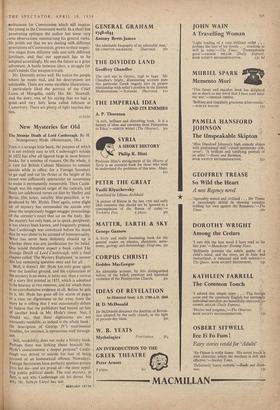New Mysteries for Old ,
Ile Strange Death of Lord Castlereagh. By H. Montgomery Hyde. (Heinemann, 18s.) Tins is a strange little book, the purpose of which t is not entirely easy to tell. Castlereagh's suicide n 1822 has after all figured large in most history moks, for a number of reasons. On the whole, it s rare for British Cabinet Ministers to commit suicide while in office; for a Foreign Secretary o go mad and cut his throat at the height of his :areer was sufficiently spectacular an occurrence
o make it permanently memorable. Then Castle- seagh was the especial target of the radicals, and here are celebrated verses on him by Shelley and Byron (the, latter, suitably blue-pencilled, is re- produced by Mr. Hyde). Then again, some slight air of mystery has surrounded the suicide ever ;ince the suspiciously hugger-mugger proceedings of the coroner's court that sat on the body. But the mystery has only been, so to speak, peripheral; it has always:been known, and frequently printed, [hat Castlereagh was convinced before his death that he was about to be accused of homosexuality. What has never been definitely cleared up is whether there was any justification for his belief. One would therefore expect a book called The Strange Death of Lord Castlereagh, with a final chapter called 'The Mystery Explained,' to answer this last remaining question once and for all.
Well, it doesn't. Mr. Hyde has only gone again over the familiar ground, and the explanation of the mystery is no more, it turns out, than a revival of a story first printed in 1855, which is admitted to be hearsay at two removes, and for which there is no corroborative evidence at all. Before he gets to it, Mr. Hyde has gone off for scores of pages at a time on digressions so far away from the story he is telling that I was occasionally driven to believe that the publishers had bound up bits of another book in Mr. Hyde's cover. Not, I should say, that these digressions are not eminently readable, as indeed is the whole book : the description of George IV's matrimonial troubles, for instance, is uproarious stuff through- out.
Still, readability does not make a history book. Perhaps there was lurking about beneath Mr. Hyde's consciousness a deeper purpose? Castle- reagh was driven to suicide for fear of being accused of an homosexual offence. Nowadays, Foreign Secretaries have perfectly spotless priyate lives but do—and are proud of—the most appal- ling public political deeds. The real mystery, in fact, is not why Castlereagh cut his throat, but Why m r. Selwyn Lloyd has not.
BERNARD LEVIN














































 Previous page
Previous page